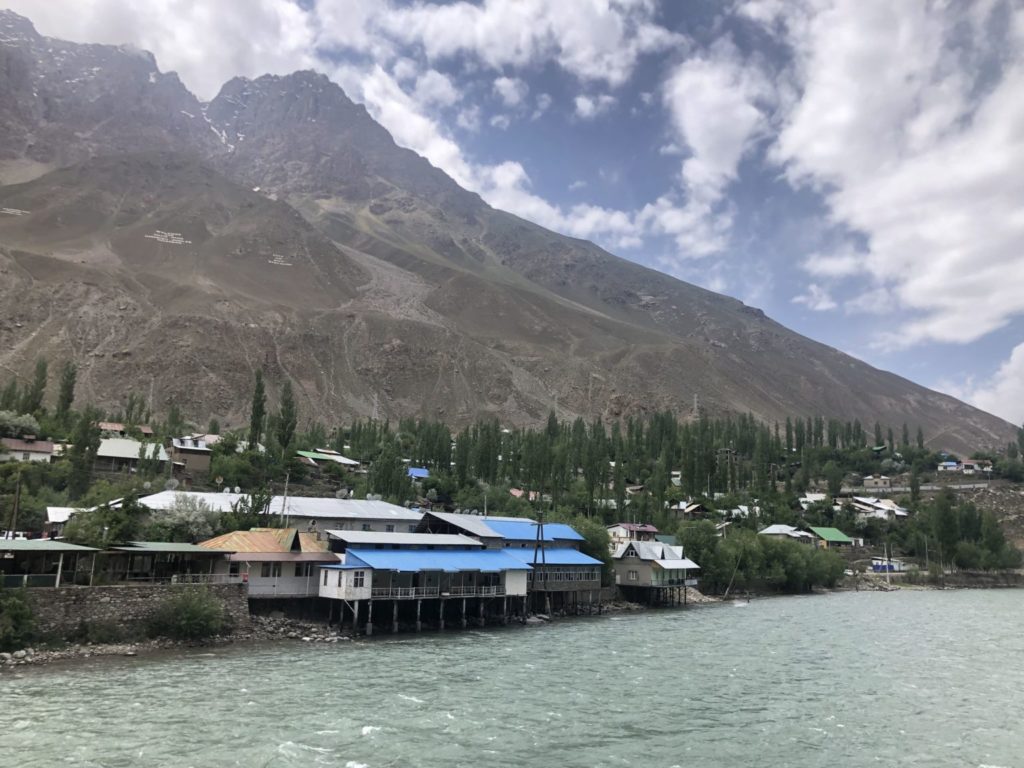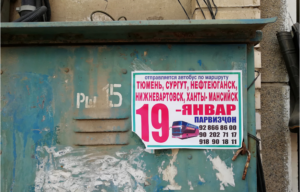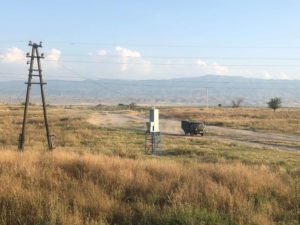The Tajik government is intensifying repression. It is particularly violent in Gorno-Badakhshan and targets the Pamiri minority: observers speak of “ethnic cleansing”.
This article was originally published on Novastan’s French website on November 19, 2022.
“It happened six months ago, but we have still not come to terms with it, neither did we understand what happened to us”, a citizen of Khorugh, the capital of the Gorno-Badakshan Autonomous Region (GBAO) in the east of Tajikistan, tells Novastan. Since the events of last May, Tajikistan is suffering an unprecedented wave of repression that is especially severe in the Pamirs. It is not the first time that demonstrations have been put down with bloody violence − it happened already in November 2021 and current events are a replay of many previous military or militia interventions in the Pamirs since the end of the civil war. But the last government action killed more people and led to a massive wave of arrests of local leaders and representatives of civil society. Officially, there are 220 Pamiris in preventive detention and, according to Radio Ozodi, the Tajik branch of Radio Free Europe, dozens have been sentenced to several years of imprisonment. Reliable sources confirm that the wounded are detained and are tortured immediately after arrest.
“Commission 44” liquidated
Formal and informal local Pamiri leaders have been specifically targeted. Members of the “Commission 44”, originally set up in November 1991 by civil society activists with the specific aim of calming the situation and establishing a dialogue between the government and the citizens, have been arrested and two condemned to 18 years in prison, according to the independent Tajik media Pamir Daily.
According to an activist in Khorugh, interviewed by Novastan, “the situation is calm now − there is not anyone else left to arrest.” The official figures are questionable: Pamir Daily states that more than 2 000 Pamiris are in prison, virtually all from the most active ones in the community. It is quite clear that the government is implementing ethnic cleansing, with the aim of purging government and NGOs of any Pamiris, as reported by Suzanne Levi-Sanchez, an expert on civil society in GBAO. Persons of influence in the region not only risk arrest − some have been murdered. One of them is Mamadbokir Mamadbokirov, from Khorugh, who was shot down in the street on May 22. The authorities accused him of being the leader of a “criminal group”.
Arrests based on ethnic differences
While the government’s aim seems to be to annihilate civil society, the arrests also target people from the Pamiri ethnic minority who are not active in politics. According to a resident of Vomar, the main town of the district of Rushan, who spoke with Novastan, “they don’t just arrest journalists and activists − now they are arresting everyone.” Bakhtiyor Safarov, founder of Central Asian Consulting and an ethnic Pamiri, states that peaceful local businessmen with no links to politics have also been arrested. He points out that these operations aim to destroy the community and its culture, without which the inhabitants of this impoverished and remote mountainous region will have difficulty in organizing their survival. There is a large number of Pamiris living abroad, mainly in Russia, from where they send remittances to their families in the communities in Tajikistan. As Suzanne Levi-Sanchez explains, the families receiving this financial help find themselves targeted by the authorities before they can share the money with others.
Kidnapping of Pamiris abroad
The Pamiri diaspora is also subject to repression. With their great sense of community solidarity, many demonstrate at Tajik embassies. Since November 2021, however, there are fewer and fewer demonstrations: participants fear not only for their families, they also have to fear abduction, forced repatriation to Tajikistan and arrest. Pamir Daily reports that more than 20 Pamiris have been kidnapped in Moscow over the last six months. According to the usual scenario, they reappear a few days later in the Tajik capital Dushanbe and are put on trial. Despite this obvious chicanery, the government films staged appearances during which they declare that they returned “voluntarily”. Russia complies with these extradition requests despite the fact that some of those concerned have acquired Russian nationality. This is the case of the brothers Oraz and Ramzi Vazirbekov. They are known for opposing the Tajik government on social media, and Radio Ozodi reports that they disappeared on June 29 at Domodedovo airport in Moscow before reappearing in Dushanbe. At the beginning of November, they were sentenced to 16 and 13 years in prison respectively.
Russia as an accomplice
As explained by Pamir Daily, in 2015 Russia declared the Islamic Renaissance Party of Tajikistan (IRPT) a “terrorist organization”, which gave more room to the Tajik government to request the extradition of its opponents. Members of the IRPT in Russia are arrested and extradited, as are other opponents of the regime. In April 2021, Amnesty International called on Russia to halt extradition of Tajiks who had expressed critical comments about the regime of President Emomali Rahmon: on arrival in Tajikistan, they were tortured and sentenced in manifestly unfair trials. In 2022, however, these arrests are not just about activists: they have a more ethnic focus. As journalist Bruce Pannier points out, Tajik authorities are trying to link the Pamiris to exiled opponents, with or without foundation. As a result, members of the diaspora who have never been involved in politics or activism now fear for their safety.
Secret courts
Salimjon Aioubzod, editor-in-chief of Radio Ozodi, explains that trials are hurried through in secret: even close family members of the accused are not allowed to have contact with them and have no access to the “evidence” presented against them. In the case of the brothers Oraz and Ramzi Vazirbekov, their family has not been able to find a lawyer to defend them. A court-appointed lawyer is in charge of the case and shares no information with the outside world. In fact, lawyers refuse to handle high-profile cases or those relating to the May events for fear of losing their licence. According to Radio Ozodi, lawyers critical of the government are not allowed to plead. As the article points out, in the Pamirs, in particular, the lack of lawyers results in dozens of cases in which the accused is unable to contest the charges against them. In GBAO there are seven accredited lawyers, but only four actually practice there, and the others are in Dushanbe. With a population of 250,000 and the large number of arrests that took place in November 2021 and last May, the defence is impossible.
Fear imposes silence
Threats and arrests of journalists prevent anyone from reporting on the suppressed protests and ethnic cleansing. Radio Ozodi reports, for example, that the Pamiri journalist and activist Ulfatkhonim Mamadshoeva, who was arrested on 18 May, faces 15 years in prison. Journalists associated with her have also been called in for interrogation. Fear is omnipresent in relation to these events. Most witnesses refuse to talk to Novastan, citing the arrests of acquaintances and friends and fearing above all repercussions for their families, even for children. One citizen of Rushan told Novastan: “People try to behave as though they can forget what has happened − because there is no point in talking about it: it only leads to worry about one’s family.” Steve Swerdlow, a Human Rights Watch researcher, also emphasizes that “anyone dealing with this subject − especially if they are Tajik − is taking a risk.”
Religious persecution
The persecution is also religious: the Pamiris are Shiites, of the Ismaili branch, as opposed to the Sunni Tajiks in the rest of Tajikistan. According to residents of Khorugh interviewed in August, religious instruction was interrupted after the May events, Ozodi reported. The Ismaili centre in Dushanbe was closed on 6 September, and, as Novastan has observed, only opened again recently. Finally, the activities of the Aga Khan Foundation (AKF), one of the main agencies for international development in the country, have been severely restricted. AKF programmes cover education, health, sustainable development and culture (but not religion, although its Chairman and founder is Aga Khan IV, spiritual leader of the Ismailis).
Towards an aggravation of the situation
The government shows no sign of relenting, and according to a specialist in the socioreligious dynamics of Tajik life – who requested anonymity but whose identity is known to this publication – without external pressure, nothing is likely to prevent the authorities from pursuing their ultimate goal of ethnic cleansing. According to Genocide Watch, which defines ten progressive stages of genocide, Tajikistan, by its persecution of the Pamiri minority, is already at stage eight. The organization has appealed to the international community to react by restoring the United Nations Mission of Observers to Tajikistan (UNMOT) withdrawn in 1997, and by taking measures to protect Central Asian republics from sanctions against Russia (that have dramatic repercussions on the Tajik economy and provoke greater instability in the region). Finally, the organization warns of the significant risk of renewed civil war, arising from ethnic persecution.
Written by Nane Bouvier
Translated from French by William Roberts
Edited by Anna Wilhelmi
For more news and analysis from Central Asia, follow us on Twitter, Facebook, Telegram, Linkedin or Instagram.
 Tajikistan: “ethnic cleansing” and repression in the Tajik Pamirs
Tajikistan: “ethnic cleansing” and repression in the Tajik Pamirs 



